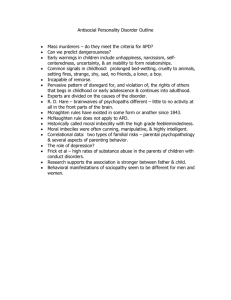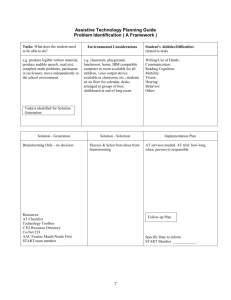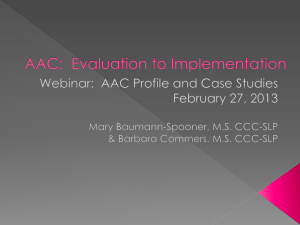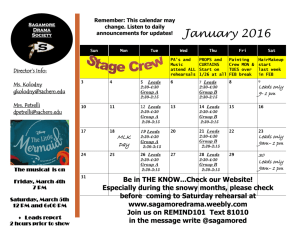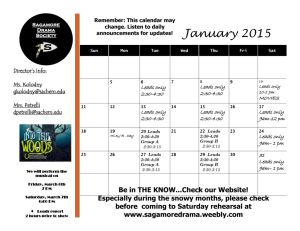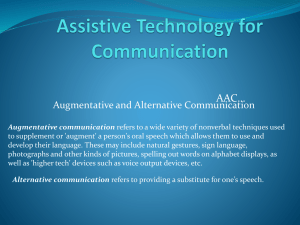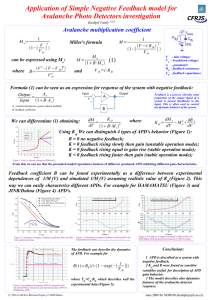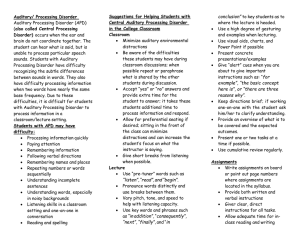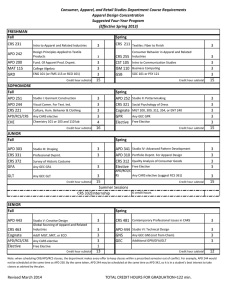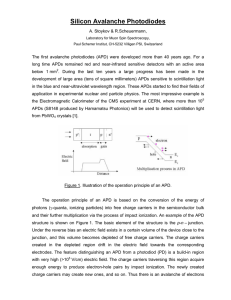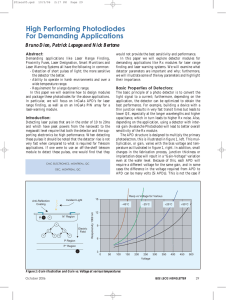Conference Schedule Thursday, March 29
advertisement
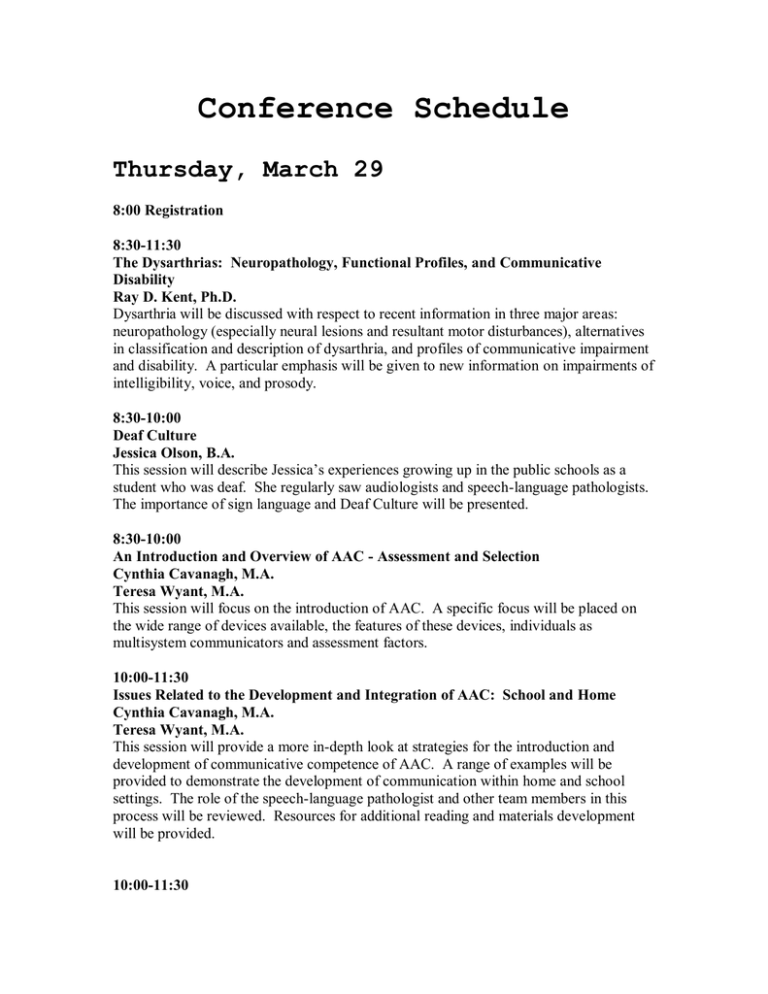
Conference Schedule Thursday, March 29 8:00 Registration 8:30-11:30 The Dysarthrias: Neuropathology, Functional Profiles, and Communicative Disability Ray D. Kent, Ph.D. Dysarthria will be discussed with respect to recent information in three major areas: neuropathology (especially neural lesions and resultant motor disturbances), alternatives in classification and description of dysarthria, and profiles of communicative impairment and disability. A particular emphasis will be given to new information on impairments of intelligibility, voice, and prosody. 8:30-10:00 Deaf Culture Jessica Olson, B.A. This session will describe Jessica’s experiences growing up in the public schools as a student who was deaf. She regularly saw audiologists and speech-language pathologists. The importance of sign language and Deaf Culture will be presented. 8:30-10:00 An Introduction and Overview of AAC - Assessment and Selection Cynthia Cavanagh, M.A. Teresa Wyant, M.A. This session will focus on the introduction of AAC. A specific focus will be placed on the wide range of devices available, the features of these devices, individuals as multisystem communicators and assessment factors. 10:00-11:30 Issues Related to the Development and Integration of AAC: School and Home Cynthia Cavanagh, M.A. Teresa Wyant, M.A. This session will provide a more in-depth look at strategies for the introduction and development of communicative competence of AAC. A range of examples will be provided to demonstrate the development of communication within home and school settings. The role of the speech-language pathologist and other team members in this process will be reviewed. Resources for additional reading and materials development will be provided. 10:00-11:30 Expert Witnessing in Audiology: What the Attorney Should Have Told You Before You Got on the Stand. Bruce L. Plakke, Ph.D. This session will discuss the basics for testifying as an expert witness. How should you prepare for a case? What are the general procedures I should expect? Informational session on giving depositions and testifying in court. 12:00-1:15 Lunch 1:30-4:30 Voice Treatment for Children Moya Andrews, Ph.D. This presentation will present a developmental perspective on treatment approaches with children. Illustrative examples of programming and strategies will be presented and the psychodynamic aspects will also be addressed. The presentation will be focused on the practical ways to treat infants through adolescents. 1:30-4:30 Professional Voice Issues Julia Rademacher, M.A. The purpose of this session is to describe the career demands on a professional voice user and the impact a voice disorder makes on such an individual. This session will also provide recommendations for clinicians who assess and treat these clients. 1:30-3:30 Visual Strategies to Enhance Communication Kathy Cross, M.A. It can take extensive effort for both the sender and receiver of information to ensure that the communication attempt accomplished its intent. The use of visual supports/tools can enhance this communication process. This presentation will introduce the concept of using visual tools to support both receptive and expressive language. Visuals as they can be used for schedules, choice boards, communicating “NO,” giving effective directions, transition helpers, task organizers, and organizing the environment will be discussed. Examples will be shared. The use of visuals for making books interactive will also be illustrated. 1:30-4:30 Learning to make Ethical Decisions in Audiology Jodell Newman-Ryan, Ph.D. A variety of approaches to improve the ethical decision-making skills of health-care professionals will be discussed and demonstrated including self-assessment values questionnaires, literature searches, websites, books, articles, value clarification exercises, and most importantly, cases and simulations. Through self-assessment and role-playing, participants will learn to “think on their feet” and make decisions that reflect favorably on the profession of Audiology. Friday, March 30 8:00 Registration 8:30-11:30 From Preschool to Adolescence: Intervention Issues in Childhood Stuttering Patricia Zebrowski, Ph.D. The focus of this presentation is to provide guidelines for assessment and treatment of childhood stuttering, with specific emphasis on critical issues relevant to different age groups within the population of children who stutter. In addition to a description of treatment strategies for improving speech fluency, such age-related factors as unassisted or natural recovery (i.e. in preschoolers), desensitization, emotional reactions, motivation issues and parent counseling will be discussed. 8:30-11:30 Expanding Access to Assistive Technologies Richard Hurtig, Ph.D. With the advent of new technologies in Augmentative and Alternative Communication as well as in Environmental Control Units, it is becoming possible to expand the populations that can be offered assistive technologies. The presentation will include case presentations illustrating the uses of AT with critical care patients, individuals with ALS, and individuals with terminal diagnoses. Part of the presentation will focus on demonstration of a new class of smart switches developed at the Assistive Devices Laboratory at the University of Iowa. 8:30-10:00 Cases of Auditory Processing Disorders: A Sudden Epidemic or Over-Diagnosis? Jodell Newman-Ryan, Ph.D. Suddenly “treatments” for (C)APD are popularized in the media, children already labeled as (C) APD are crawling out of the woodwork, and appointments are overflowing with children suspected of having (C)APD. Yet without professional agreement on whether this condition exists or how to diagnose and treat it, children with suspected listening difficulties often are mislabeled and consequently not managed appropriately. A model will be presented which strongly advocate for APD as a diagnosis of exclusion and managed of the overall treatment instead of as separate (C)APD. 10:00-11:30 Newborn Hearing Screening and the Significance of Early Identification Lenore Holte, Ph.D. In the last decade, positive speech and language outcomes for hearing-impaired children have been shown to be directly related to the age at which hearing loss is identified and early intervention begins. The evidence for this relationship will be presented, along with evidence that universal newborn hearing screening is the most effective way to reduce age of identification. An overview of the universal newborn hearing screening program in Iowa will also be presented. 12:00-1:15 Lunch 1:30-3:30 Storybook Aided Language Stimulation: Strategies for Improved Verbal Output for Children Julianne Daly-Baysden, M.A. Nancy Baethke, M.S. The purpose of this session is to demonstrate the use of storybooks and other literary tools to promote language stimulation. It is geared toward those working in early intervention and elementary school settings. 1:30-3:00 Demonstrating the Difference We Make in Patient Outcomes Janel Lehmkuhl, M.A. This demonstration will describe the role and use of standardized language in an interdisciplinary computerized clinical documentation system. The contributions made by Speech Pathology in developing the system and the benefits to the profession will be discussed. 3:00-4:30 Awareness Deficits in Traumatic Brain Injury Angela N. Burda, Ph.D. Often, persons who suffer traumatic brain injuries have limited awareness and insight into their resulting deficits. This session will review information regarding these deficits in the TBI population. Additionally, treatment approaches to facilitate improvement in awareness with this population will also be presented.
